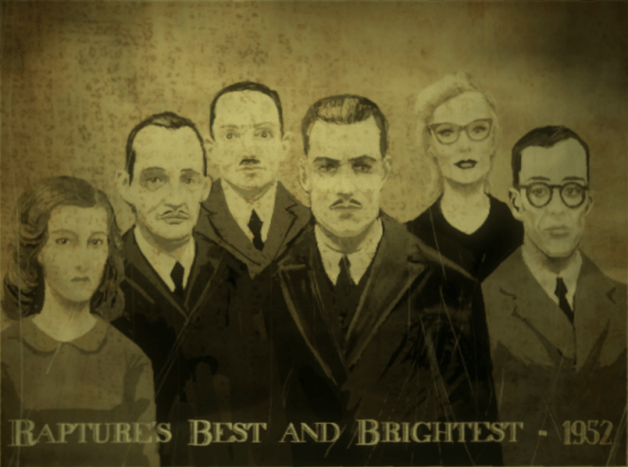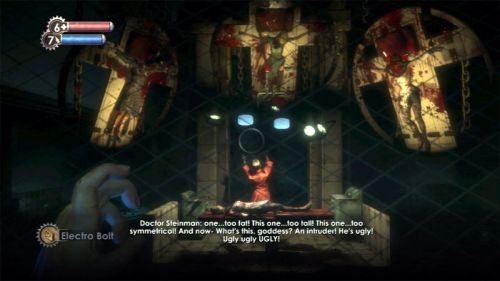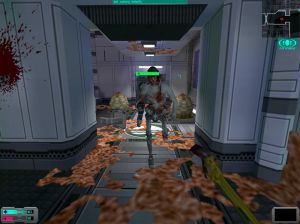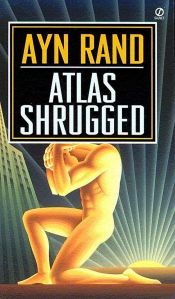Trending
Opinion: How will Project 2025 impact game developers?
The Heritage Foundation's manifesto for the possible next administration could do great harm to many, including large portions of the game development community.
As Bioshock Infinite will be upon us in a little more than a months time, I played the original Bioshock for the first time recently, something I'd been planning to do but until now never got to. Here are my thoughts on the most interesting aspects.

(this post was published initially on my personal blog lostinthezone.wordpress.com)
I had never played Bioshock, a game that the majority of the gaming world has been praising to the heavens for years now. In anticipation of Bioshock Infinite I decided to take care of that particular issue, approximately five years after the release of the game. It's a game that is rich in substance, or at least in comparison to most other games in the genre. I'm going to offer my thoughts on a range of aspects of the game, and even give a little verdict at the end. Would you kindly read on?
Rapture is even today a fascinating place to experience
Over the years, much has been said about Rapture, the failed objectivist city built on the bottom of the Atlantic ocean. It really is a piece of art, visually and audibly. While the actual fidelity of the graphics engine is now a good step behind what is possible now, it doesn't look like it. Water is dripping into the rooms and corridors, creating puddles everywhere. Every step you take on the wooden floors, or as you wade through waist high water flooded basements contributes to a soundscape that evokes the same feel I get at the end of Titanic, when Jack and Rose make their way through the innards of the sinking ship. It might seem a minor thing to focus on, but it really stood out to me and added greatly to the immersiveness of Rapture. But there is more. Every area is different and feels like a real place. A hallway leading to the Rapture metro, a tailor's workshop, a theater, a bar. All these places feel like people could have plausibly used and lived in them. Rapture just works.
Actually Rapture used to work. Now it is a mess, everything is destroyed. There is a strong fascination with a place that is originally so glamorous and high class, torn down to the lowest lows. It looks like a retreat for drug addicts at times, sometimes like ruins of a war torn city. There's chaos everywhere, and yet it is easy to imagine what Rapture must have been like at its best of times. Bioshock is an amazing experience when you just walk around it and let its world stir the imagination. There is a melancholy, that something that was clearly an amazing human achievement fell so far from grace, but there is also a disgust at not just the current state of it, but at some of the extremism and inhumanity shown by the people who lived there, following their pursuits without limits.
Characters of Bioshock
The people of Rapture
Bioshock's next strength is in its writing, and nowhere is this more evident than in the audio logs that important characters have kindly left behind for you. What makes them interesting is that these characters were clearly people with their own convictions, who lived in their own realities. Be it the genetic scientist Tenenbaum, the plastic surgeon Steinman or the artist Sander Cohen, all these characters are distinct and what is most frightening, their convictions are understandable. Tenenbaum is obsessed with the possibilities of genetic engineering, Steinman is obsessed with beauty and the abstract art of Picasso. Sander Cohen is obsessed with human models and poses made in gypsum.

At the core, each of these people's pursuits are worthwhile, but the freedom to do whatever they want in Rapture lets them cross any lines of morality. It is these people that deliver what is in my mind the main message of Bioshock: freedom that ignores the whole of society, when the individual is prioritized above all else, will lead to the self destruction of that society, for there is no fabric that holds it together. I will get back to my own thoughts on this statement later.
On judging the quality of games
I've always had an issue with numerically rating video games. It just feels wrong, like it is a fundamentally disrespectful attitude to have for what is a product of human creativity. By assigning numbers to a game, it feels like one is treating it like a functional object, like a fridge. It is quite easy to judge a fridge. How well does it keep cool, how efficient is it with its power usage, how much space is there, how heavy is it, etc etc. There is a linear way to measure how good a fridge is. But games, and all other forms of art are generally not there to be simple fun-dispensers. There are a miriad of goals an artist can have when creating something. Sometimes it is entertainment, sometimes it is to shock people, sometimes it is to confuse and play with people's expectations. Whatever seems worthwhile for the artist. Video games are not fun-dispensers, which is why I have an issue with calling them games in the first place. But anyways, here's my suggestion, because I actually find numerical ratings quite useful. There are differences in quality between games, and there is a use for being able to quantify it.
How about this: when reviewing a game, which is a subjective undertaking anyways, let the reviewer state what he/she thinks the point or goal of the game is. Whatever (the reviewer thinks) the goal is, let the game be judged on that alone. Does it achieve what it sets out to do? For example, Super Meat Boy is a game that has (in my mind) really one goal: it aims to be a 2D jump and run platformer with great controls and challenging levels. In my opinion, it achieves this result with aplomb, and gets extra credit for innovatively reducing frustration by letting the player watch a glorious replay of all previous attempts merged into one. So on a scale from 0 to 10, where 0 means it totally did not achieve its goal, and 10 meaning it did achieve its goal perfectly, I would rate it a 10/10. Now, if I interpreted the game differently and thought the entire point of the game is to be an open world RPG with meaningful choices, the game would have to get an abysmal 0 out of 10. Both are valid interpretations, because it's all subjective. Using this approach to reviewing, we can get rid of the basis on which so many pointless debates are based on, when apples and oranges are compared. I find it lame every time I see an angry commenter's outrage that site X thinks The Walking Dead is worse than Call of Duty because it got one point more on the scale.
For example, Super Meat Boy is a game that has (in my mind) really one goal: it aims to be a 2D jump and run platformer with great controls and challenging levels. In my opinion, it achieves this result with aplomb, and gets extra credit for innovatively reducing frustration by letting the player watch a glorious replay of all previous attempts merged into one. So on a scale from 0 to 10, where 0 means it totally did not achieve its goal, and 10 meaning it did achieve its goal perfectly, I would rate it a 10/10. Now, if I interpreted the game differently and thought the entire point of the game is to be an open world RPG with meaningful choices, the game would have to get an abysmal 0 out of 10. Both are valid interpretations, because it's all subjective. Using this approach to reviewing, we can get rid of the basis on which so many pointless debates are based on, when apples and oranges are compared. I find it lame every time I see an angry commenter's outrage that site X thinks The Walking Dead is worse than Call of Duty because it got one point more on the scale.
Judging Bioshock
Ken Levine said in a demonstration of Bioshock at E3 in 2006:
"What we're trying to do is redefine what it means to be a first person shooter. Our goal is to put a stake in the heart of all those cliches you've been playing for years in first person shooters; the linear corridors, the very static environments and the cookie cutter AIs."
This, right here is exactly the measure against which this game must be judged by. This is the goal of Bioshock as stated by the man himself. It is true, Bioshock has less linearity than most FPS's. Entire areas of Rapture can and must be retraced. The environments are static actually, at least in a physical sense. Gameplay wise, there is much dynamism in the game. Not only do the powers offer interesting tactical possibilities to experiment with (electric bolt into water, freezing enemies before hitting them with the wrench, setting puddles of fuel on fire, etc) but the allegiance of turrets can drastically influence the tide of battle. There is an element of emergent gameplay there that is welcome, though it isn't all that innovative. Maybe in 2007 it truly was.
 The AI in the game is more varied than what you see in most shooters, though by not so much. Big Daddies will not attack you immediately and protect their little sisters. Splicers will always attack you on sight, but have differing patterns of movement and sometimes will run away. The most interesting thing is that the enemies will have fights amongst each other dynamically and without the player's participation. This is all very good and makes for very satisfying shooter mechanics. I can't exactly say what it was like in 2007, but I don't think Bioshock was truly redefining FPS's back then. For starters, Bioshock's entire structure was basically taken over from System Shock 2 (You are alone in a confined place where something terrible has happened to the people in it. They turned into tragic mindless monsters, but you are contacted by a survivor and so forth). This isn't automatically to Bioshock's discredit, but it is hardly the way to redefine a genre by imitating so much of a game that is 7 years older. What would have been more accurate would be to say that the game was trying to redefine FPS's on consoles. I don't think there was an FPS prior to Bioshock on consoles that had its level of gameplay complexity.
The AI in the game is more varied than what you see in most shooters, though by not so much. Big Daddies will not attack you immediately and protect their little sisters. Splicers will always attack you on sight, but have differing patterns of movement and sometimes will run away. The most interesting thing is that the enemies will have fights amongst each other dynamically and without the player's participation. This is all very good and makes for very satisfying shooter mechanics. I can't exactly say what it was like in 2007, but I don't think Bioshock was truly redefining FPS's back then. For starters, Bioshock's entire structure was basically taken over from System Shock 2 (You are alone in a confined place where something terrible has happened to the people in it. They turned into tragic mindless monsters, but you are contacted by a survivor and so forth). This isn't automatically to Bioshock's discredit, but it is hardly the way to redefine a genre by imitating so much of a game that is 7 years older. What would have been more accurate would be to say that the game was trying to redefine FPS's on consoles. I don't think there was an FPS prior to Bioshock on consoles that had its level of gameplay complexity.
It is quite vague though to say "...what it means to be a first person shooter". What does it mean? There are many possible interpretations, but I think he was talking about the sense of being present in a space that the first person perspective allows for. In that regard, Bioshock really did raise the bar, thanks to the incredible audio-visual quality of Rapture.
Taking all these into account, I would give the game a 7 or 8 out of 10. This would mean that the game did have some innovations or qualities (setting and polish) that let it stand out amongst first person shooters, but it does not actually redefine the genre. It is still very much a shooter. Does it make other shooters look cliched and simplistic by comparison? It does, mostly thanks to the creativity and uniqueness of its setting and characters.
Bioshock as a critique of objectivsm
 It is to Bioshock's credit, that there is talk amongst gamers that it is a critique of objectivism. What an unusual thing to see in a game. Isn't such stuff the domain of...works of art? So many people have proclaimed that Bioshock is the proof that games can be art. I'm going into muddy territory here and I'm probably going to get stuck, but I'll give it a try.
It is to Bioshock's credit, that there is talk amongst gamers that it is a critique of objectivism. What an unusual thing to see in a game. Isn't such stuff the domain of...works of art? So many people have proclaimed that Bioshock is the proof that games can be art. I'm going into muddy territory here and I'm probably going to get stuck, but I'll give it a try.
As I wrote earlier, I think the backstory of Bioshock has a message which is that freedom that ignores the whole of society, when the individual is prioritized above all else, will lead to the self destruction of that society, for there is no fabric that holds it together.
As you play through the game, the environment and audio logs work in tandem to expose the backstory of Rapture. Andrew Ryan, the equivalent of Ayn Rand, built a city where any person could go and pursue their interests, no matter if they were scientific, artistic or economical. There would be no laws or government, for Ryan believed that any limits imposed on man would hinder the progress to prosperity of the whole. The idea is that when everybody prioritized themselves, the whole of society would indirectly prosper. It is a very interesting way to look at things to say the least. I was compelled to find out more about Ayn Rand and watched some interviews where she talks about this philosophy. She thinks that at the heart of every action should be a selfish or self-centered motivation. If I am loving towards my wife, it is only because it is in my interest to have a happy wife and the same counts for her. But if I am unhappy with her yet still am nice to her, not voicing my concern, I am putting her above me, which would lead to problems further down the line. She means that out of the fulfillment of the individual's interest, the collective will automatically be fulfilled too. I think this is very much a life philosophy version of free market capitalism. Rand had an issue with the whole notion of government, because government tries to impose on people in the interest of the collective from the top to bottom, where in her mind, the evolution of society needed to be left to work itself out, without any laws and enforcement.
I personally don't agree with Rand's philosophy in some aspects, but you can certainly see the sense and logic in her thinking. I could elaborate on my thoughts, but that is something for another post.
What people say about Bioshock is that it shows what happens when you let objectivism run loose. First of all: Bioshock's backstory cannot be taken as a serious argument against objectivism because it introduces the MacGuffin that is Adam. Adam is the whole reason why Rapture went to hell. Sure, the seeds were there in the eccentric characters with their obsessions, but because of splicing, you cannot take anything serious that happened in Rapture since, because they were all pretty much out of their minds, and because there is no such substance as Adam in the real world. Who knows how Rapture would have fared if Adam never appeared? It is not plausible to state that objectivism failed because of a horrendous drug addiction that befell all the people in society. On the other hand, one could make a case that Adam really is just an amplifier, used to drive the point home a hundred times harder that objectivism is self destructive. That is the problem with Adam, it can mean anything and do anything, and anything can be explained with it.

Is Bioshock art or does it just have a lot of great art?
I'm just throwing this last one out there because this is a question I've asked myself many times over. I've seen people proclaim it as art, and also others saying that because games are a combination of many art forms, they can't be anything but art (for example in Indie Game: The Movie). Well, is that true? Bioshock clearly has amazing art direction. Almost every location has some sort of impact when first seen. The level design is far and above almost any FPS I've ever played. The sound design is pure class too. From the voice acting, the ambient noises of this underwater city to the low groan of the Big Daddies, Bioshock is a feast for the ears. Combined, they result in one of the most memorable gaming experiences ever. But does all this high class art add up to one super piece of art? (lol)
In my mind, I always have thought the uniqueness of video games is the interactivity. Film has a visual and audible element that literature does not have, and by using these effectively and with a vision, a film can become a great piece of art. A book can be a great piece of art, merely with the help of the written word and the imagination of the reader. A game can be a piece of art, but it really only depends on how the creator utilizes interactivity. Games are still in its early stages because we're still figuring interactivity out. For now, we can adequately model gun combat, car racing, and many other things. Some of it is a form of simulating the real world, some of it is very abstract (like Super Hexagon). There is so much uncharted land in interactivity, but Bioshock does not set out to find some more. If it had found a way to realize a gameplay mechanic that models the inherent issues with objectivist codex of action (putting the self above others), then we could say that Bioshock as a game makes a case against objectivism. What we are left with however, is a better FPS than most others, but not one that is any more or less a work of art than Call of Duty.
Read more about:
BlogsYou May Also Like